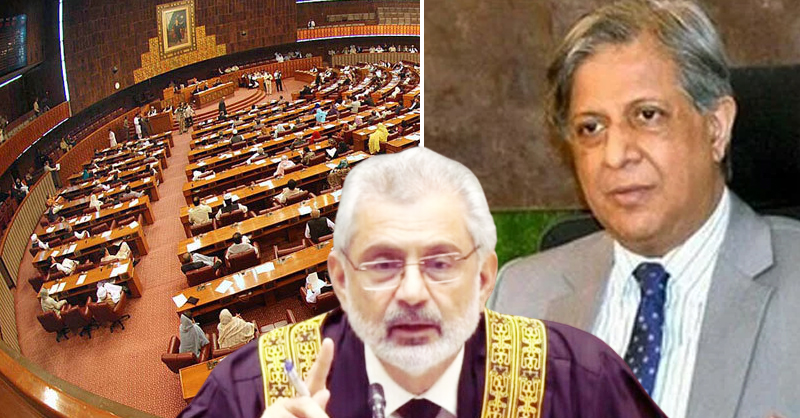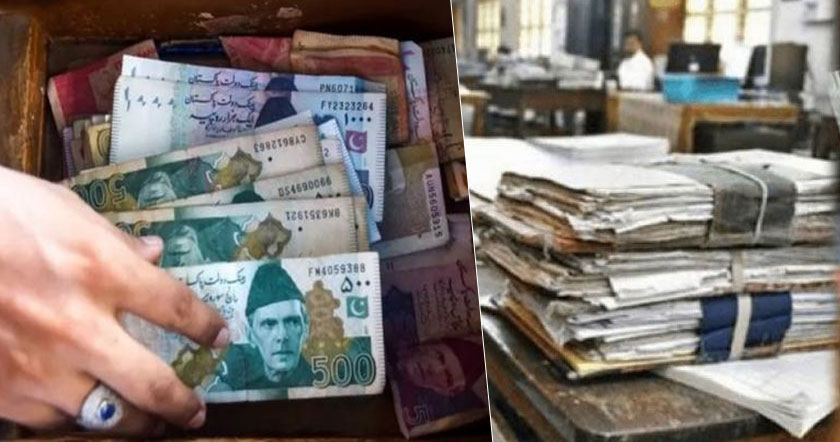[h=1]The cost of brinkmanship in international law[/h] By Waris Husain | DAWN.COM (6 hours ago) Today
 Though the US has escaped international inspection on the Osama bin Laden raid, if a suit is filed against Pakistan, Pakistan can file a countersuit alleging a violation of its sovereignty through the raid. Dawn File Photo
Though the US has escaped international inspection on the Osama bin Laden raid, if a suit is filed against Pakistan, Pakistan can file a countersuit alleging a violation of its sovereignty through the raid. Dawn File Photo
The US Supreme Court once stated, to ensure that justice is done, it is imperative to the function of courts that. evidence needed either by the prosecution or by the defence, be produced by any party involved in the case. This should alarm officials in Washington and Islamabad who now wish to rely on the International Court of Justice (ICJ), but previously relied on the secretive nature of the Pak-US relationship to conceal their violations of international law.
An issue raised by several government officials and commentators has been whether Pakistan should take up a case with the ICJ over the US drone program conducting missions on Pakistani territory. There would be a solid case for Pakistan based on the international treaties that the US has signed, including the Geneva Conventions which prohibits a state from targeting civilians in an act of war. While the reports concerning the civilian deaths caused by drone attacks are conflicting, any amount of deaths would be actionable against the US under its international obligations.
However, there are two international legal principles that should make the State of Pakistan pause before submitting their case to the ICJ. First, under international law, a nation must exhaust all local remedies before it attempts to sue another state in the ICJ. As Dawood Ishmail Ahmed explained in Foreign Policy Magazine, Pakistan must first apply pressure domestically. This means that high-ranking Pakistani military and civilian leaders, who secretly allowed the US to conduct drone attacks, must be prosecuted in Pakistani courts before the US can be brought in international court.
Alternatively, while the ICJ may choose to accept jurisdiction over the case, despite the lack of local remedies, there is still a threat for Pakistans leaders. By bringing a claim under international law, the complaining party has opened the door for the court to scrutinise any of the states own wrongdoings. This may require Pakistans government to produce its top generals and civilian leaders for prosecution based on their agreements to allow the US to conduct its drone program. The unfavorable and highly unlikely nature of that precondition has led the US to laugh off the threats by Pakistan to take its case to the international community.
On the other hand, the US has threatened that it would utilise international law to prosecute Pakistan for its links with terrorist groups. Between the recently passed UN order that prohibits states from assisting al Qaeda operatives and the long-running link between the ISI and banned terrorist groups, it seems that the US would have a credible case. However, just as with Pakistan, the United States faces a threat in opening the door for the international court to examine its own actions under international law.
Though the US has escaped international inspection on the Osama bin Laden raid, if a suit is filed against Pakistan, Pakistan can file a countersuit alleging a violation of its sovereignty through the raid. Article 2 of the UN Charter protects the sovereignty of all nations and prohibits the threat or use of force against a member nation, which Pakistan is. In instances where the use of force is permitted against non-state actors, the UN requires the attacking party either to seek the consent of the state in which it wishes to attack or to inform the UN.
The US violated all of these obligations in conducting the raid unilaterally without the consent of the UN or Pakistan. Thus, in a case between Pakistan and the US, the ICJ would likely demand a response to such claims. Though the court may hold that the US has not violated the Charter under the doctrine of self defense, the process of examining such claims would expose the US to an international scrutiny that it is not prepared for.
The best example of how Pakistan and the US are both violating their international obligations while accusing the other of the same is the current controversy over diplomats. Recently, the Pakistani Foreign Ministry issued a letter informing the American Embassy in Islamabad that its staff must register with the state in order to travel outside the capital city. Having heard of such threats, the US government responded with its own threats that would limit the mobility of Pakistani diplomats and their staff.
This tit-for-tat exchange doesnt merely complicate the strained Pak-US relationship, but it is a clear violation of their both nations duties under the Vienna Convention on Diplomatic Relations. The US and Pakistan are both signatories to this Convention, which requires, in Article 26, that the receiving State ensure to all members of the mission freedom of movement and travel in its territory. While a nation may limit diplomatic freedoms to ensure state security, the general spirit of the Convention guarantees mobility for all diplomats. Thus, the international courts are unlikely going to accept the current threats on both sides as anything more than a case of diplomatic brinkmanship.
Beyond the realm of legal arguments, it is likely that Pakistan will face an up-hill battle if it attempts to take the US to international court, due to Pakistans reputation in the Western World. However, both nations would face scrutiny as to their own compliance with international law when making a complaint against the other nation. So, the real question is what costs are both nations willing to pay in order to push the other to the legal brink?
The writer holds a Juris Doctorate in the US and is a researcher on comparative law and international law issues

As the relationship between the US and Pakistan continues to sour, both nations are attempting to intimidate each other through threats of seeking redress under international law. While the use of international law could greatly help mediate conflicts between these two nations, both should be aware of the consequences of initiating such an action.The US Supreme Court once stated, to ensure that justice is done, it is imperative to the function of courts that. evidence needed either by the prosecution or by the defence, be produced by any party involved in the case. This should alarm officials in Washington and Islamabad who now wish to rely on the International Court of Justice (ICJ), but previously relied on the secretive nature of the Pak-US relationship to conceal their violations of international law.
An issue raised by several government officials and commentators has been whether Pakistan should take up a case with the ICJ over the US drone program conducting missions on Pakistani territory. There would be a solid case for Pakistan based on the international treaties that the US has signed, including the Geneva Conventions which prohibits a state from targeting civilians in an act of war. While the reports concerning the civilian deaths caused by drone attacks are conflicting, any amount of deaths would be actionable against the US under its international obligations.
However, there are two international legal principles that should make the State of Pakistan pause before submitting their case to the ICJ. First, under international law, a nation must exhaust all local remedies before it attempts to sue another state in the ICJ. As Dawood Ishmail Ahmed explained in Foreign Policy Magazine, Pakistan must first apply pressure domestically. This means that high-ranking Pakistani military and civilian leaders, who secretly allowed the US to conduct drone attacks, must be prosecuted in Pakistani courts before the US can be brought in international court.
Alternatively, while the ICJ may choose to accept jurisdiction over the case, despite the lack of local remedies, there is still a threat for Pakistans leaders. By bringing a claim under international law, the complaining party has opened the door for the court to scrutinise any of the states own wrongdoings. This may require Pakistans government to produce its top generals and civilian leaders for prosecution based on their agreements to allow the US to conduct its drone program. The unfavorable and highly unlikely nature of that precondition has led the US to laugh off the threats by Pakistan to take its case to the international community.
On the other hand, the US has threatened that it would utilise international law to prosecute Pakistan for its links with terrorist groups. Between the recently passed UN order that prohibits states from assisting al Qaeda operatives and the long-running link between the ISI and banned terrorist groups, it seems that the US would have a credible case. However, just as with Pakistan, the United States faces a threat in opening the door for the international court to examine its own actions under international law.
Though the US has escaped international inspection on the Osama bin Laden raid, if a suit is filed against Pakistan, Pakistan can file a countersuit alleging a violation of its sovereignty through the raid. Article 2 of the UN Charter protects the sovereignty of all nations and prohibits the threat or use of force against a member nation, which Pakistan is. In instances where the use of force is permitted against non-state actors, the UN requires the attacking party either to seek the consent of the state in which it wishes to attack or to inform the UN.
The US violated all of these obligations in conducting the raid unilaterally without the consent of the UN or Pakistan. Thus, in a case between Pakistan and the US, the ICJ would likely demand a response to such claims. Though the court may hold that the US has not violated the Charter under the doctrine of self defense, the process of examining such claims would expose the US to an international scrutiny that it is not prepared for.
The best example of how Pakistan and the US are both violating their international obligations while accusing the other of the same is the current controversy over diplomats. Recently, the Pakistani Foreign Ministry issued a letter informing the American Embassy in Islamabad that its staff must register with the state in order to travel outside the capital city. Having heard of such threats, the US government responded with its own threats that would limit the mobility of Pakistani diplomats and their staff.
This tit-for-tat exchange doesnt merely complicate the strained Pak-US relationship, but it is a clear violation of their both nations duties under the Vienna Convention on Diplomatic Relations. The US and Pakistan are both signatories to this Convention, which requires, in Article 26, that the receiving State ensure to all members of the mission freedom of movement and travel in its territory. While a nation may limit diplomatic freedoms to ensure state security, the general spirit of the Convention guarantees mobility for all diplomats. Thus, the international courts are unlikely going to accept the current threats on both sides as anything more than a case of diplomatic brinkmanship.
Beyond the realm of legal arguments, it is likely that Pakistan will face an up-hill battle if it attempts to take the US to international court, due to Pakistans reputation in the Western World. However, both nations would face scrutiny as to their own compliance with international law when making a complaint against the other nation. So, the real question is what costs are both nations willing to pay in order to push the other to the legal brink?
The writer holds a Juris Doctorate in the US and is a researcher on comparative law and international law issues






























